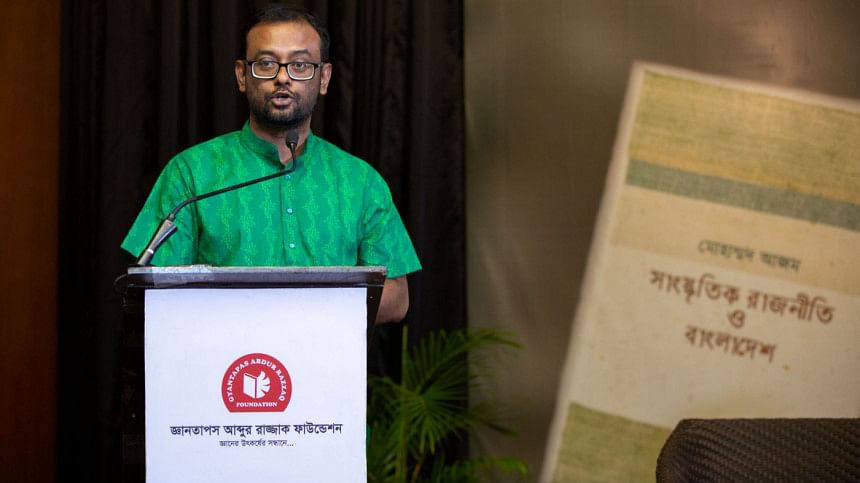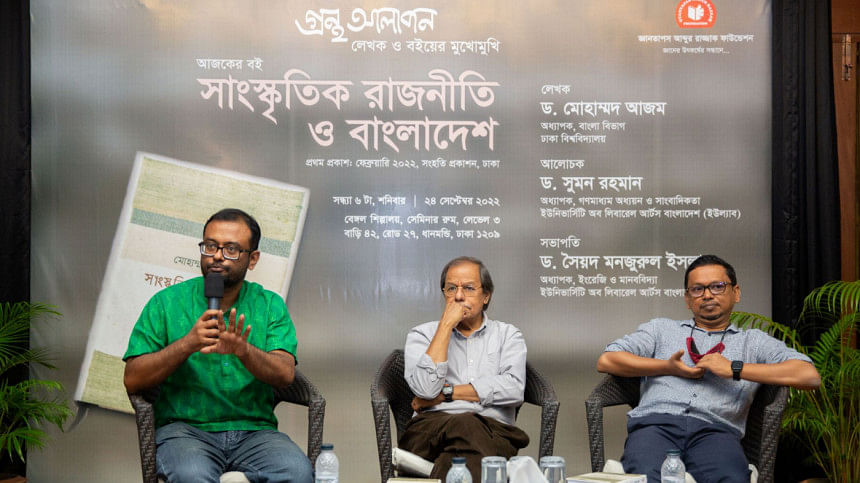'Bangladesh is divided along cultural fault lines', Professor Mohammad Azam discusses at Gyantaposh Abdur Razzak Foundation

Gronthoalapon: Lekhok O Boier Mukhomukhi, a book discussion event, was hosted by the Gyantaposh Abdur Razzak Foundation on the evening of Saturday, September 24 at Dhanmondi's Bengal Foundation. The discussion focused on a recently published book titled Shanskritik Rajneeti O Bangladesh (Sanghati Prokashon, 2022), written by Professor Dr. Mohammad Azam of Dhaka University's Department of Bangla.
During his speech, Professor Azam said that the book may be considered in discussions surrounding the "celebration of Bangladesh". Commenting on the country's intellectual tradition, he said that Bangladesh has lost the culture of discourse. The culture and traditions of the country have been colonised. Thoughts which originate in Kolkata are being accepted in Dhaka's society without due consideration.
However, it is to be noted that the intellectual growth which happened in Kolkata within 150 to 200 years has not happened in Dhaka, the author notes. At present, Bangladesh is divided along cultural fault lines.

After the author's speech, Dr Sumon Rahman, Professor of Media Studies and Journalism at the University of Liberal Arts Bangladesh (ULAB), engaged in a discussion about the book. He said, "In Bangladesh, politics has become extremely polarised. This is why Mohammad Azam, in one of his essays, thinks that there is a large gap between the identities of a Muslim and that of a Bengali."
We also tend to accept cultural and intellectual concepts originating in the West without any judgement without properly discussing ideas such as modernity and secularism, Dr. Rahman said.
The event was chaired by Dr. Syed Manzoorul Islam, Professor at ULAB's Department of English and Humanities. During his speech, he said that we are not used to thinking by ourselves and are often reluctant to accept any stream of thought contrary to that which we already know. However, thoughts are multi-faceted and each of them emit light. Our education system does not teach us about how to be critical. The word "intellectual" has worn out here at present. While commenting on the book, he said, "Azam's book has reflected the thoughts which pervade through society."
The event began with a welcome speech from the foundation's Director, Professor Emeritus Ahrar Ahmed.
Gyantaposh Abdur Razzak Foundation regularly organises events to encourage local writers and intellectuals. "To this day, we tend to rely on foreign nations for seeking knowledge, which we should not do. It would encourage individuals to think more freely and in an interrogative manner and would make them more eager to take part in academic as well as constructive discourse", Professor Ahmed said.
The event was attended by many young writers and researchers.

 For all latest news, follow The Daily Star's Google News channel.
For all latest news, follow The Daily Star's Google News channel. 








Comments